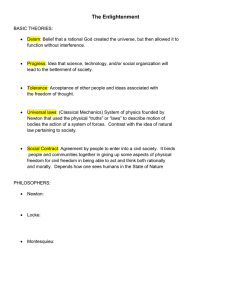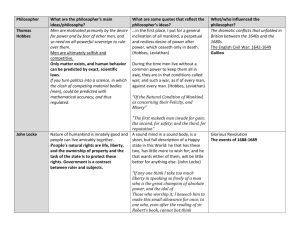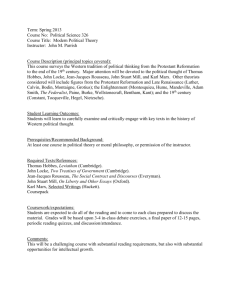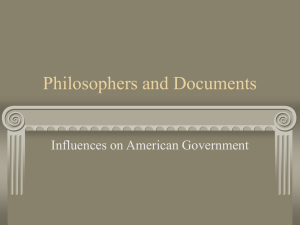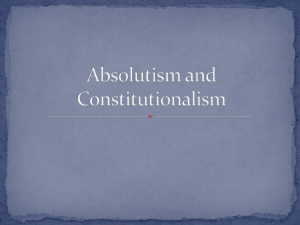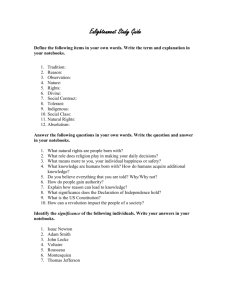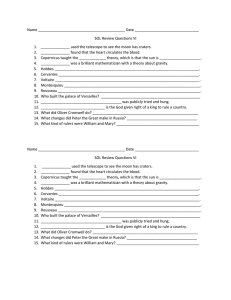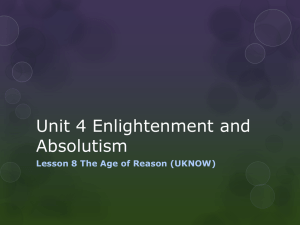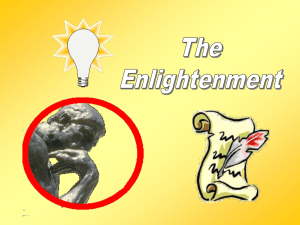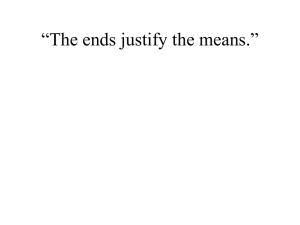Enlightenment PPT
advertisement
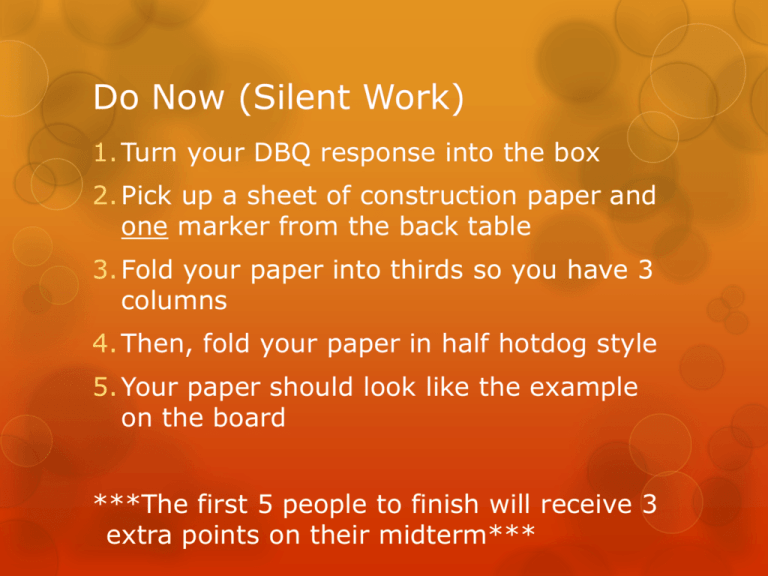
Do Now (Silent Work) 1. Turn your DBQ response into the box 2. Pick up a sheet of construction paper and one marker from the back table 3. Fold your paper into thirds so you have 3 columns 4. Then, fold your paper in half hotdog style 5. Your paper should look like the example on the board ***The first 5 people to finish will receive 3 extra points on their midterm*** The Enlightenment in Europe The Age of Reason 1600’s a new generation of philosophers Reason could solve human problems Enlightenment- age of reason, time of optimism and possibility The Age of Reason People gathered in public and coffee houses to debate ideas Writers published ideas in books and magazines 1700’s Paris was the center for intellectual activity Salons-Parisian women hosted gatherings of philosophers, artists, and scientists Thomas Hobbes Thomas Hobbes-wrote Leviathan said people were selfish and greedy In a natural state people were “solitary, poor, nasty, brutish, and short” People needed a powerful government New Views on Government People would agree to give up some freedoms in exchange for peace and safety Social contract-exchange between society and the government Absolute monarchy first form of government John Locke People are naturally happy, tolerant, and reasonable He argued all people are born equal Natural rights of life, liberty and property Purpose of government is to protect peoples rights John Locke Said monarchs were not chosen by God People consented to be governed Governments power to be limited by laws If government failed to protect their rights, then people should overthrow it Inspired revolutionaries in Europe and the Americas Philosophes- period in France 1. Reason- enlightened thinkers believed truth could be discovered thrugh reason and logical thinking 2. Nature- The philosophes believed that what was natural was also good and reasonable 3. Happiness- rejected the medieval notion that people should find joy in the hereafter and urges people not to seek wellbeing on earthe Progress- stressed that society and humankind could improve Liberty- for the liberties that the English people had won in their Glorious Revolution and Bill of Rights Jean-Jacques Rousseau French philosopher Believed people were born good Society corrupted people Social Contract wrote “man is born free but everywhere is in chains” Jean-Jacques Rousseau Believed government should work for the common good Not for the wealthy few Individuals should give up some freedoms to benefit the country as a whole Despised inequality in society Also inspired revolutionaries Baron de Montesquieu Best form of government included a separation of powers Prevent one group from abusing its power The Spirit of Laws – admiration for British government and its separation of powers Baron de Montesquieu Separation of powers led to a checks and balance system Became an important structure in later democratic governments (USA) Voltaire Combats Intolerance Voltaire- outspoken French Philosopher Attacked injustice Nobility Church government Struggled for religious toleration and justice Voltaire Combats Intolerance Francis Marie Arouethis pen name was Voltaire Imprisoned for making fun of an official “I do not agree with a word you say but will defend to the death your right to say it.” Beccaria promotes Criminal Justice Laws existed to promtoe social order Criticized abuses of justice Torturing witnesses Irregular procedures at trials Punishments that were arbitrary and cruel Beccaria Promotes Criminal Justice Person has a right to a speedy trial Torture should never be used Punishment based on the crime Capital punishment should be abolished Influenced laws in Europe and North America Mary Wollstonecraft Rejected that women are just wives and mothers 1792 wrote A Vindication of the Rights of Woman If men and women had equal education, then they would be equal in society Legacy of Enlightenment Theories inspired revolutions France, United States Long term effects shaped Western Civilization Growth of scientific knowledge Success of Scientific Revolution gave people the confidence that reason could solve social problems Adam Smith Used reason to analyze economic systems 1776 The Wealth of Nations Business activities should take place in a free market Laissez-faire economics-economic system without government regulation Later, Times and Places Challenged beliefs in absolute monarchy Relationship between the church and state Roles and rights of people Human reason could solve any problem Later, Times and Places Ideas of power and authority would inspire ideas and revolution American colonies would break away Strongly influenced by Locke and Rousseau
